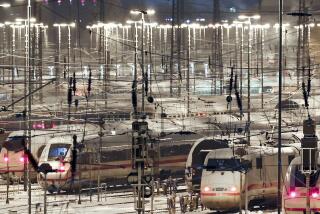Germany’s East Faces 1st Strike in Six Decades
- Share via
BERLIN — Already decimated by the effects of unification, eastern German industry faced further problems Wednesday after steel and metalworkers’ unions voted overwhelmingly to launch the first officially sanctioned strike in the region for more than six decades.
Union officials said the first stoppages could come as early as Monday in both industries.
“They (employers) have only a few hours to reverse their position,” warned Franz Steinkuehler, chairman of Germany’s large metalworking union IG Metall.
The union’s executive board is scheduled to meet today to determine when the strike will start.
At least initially, large metalworking and steel plants in western Germany will remain unaffected by the dispute in the former Communist eastern region.
Eastern workers in both the important metalworking industry and the smaller steel sector are demanding that employers stick to a commitment made two years ago in the optimistic afterglow of unity to raise eastern wages to western German levels by April, 1995.
Under terms of that commitment, employers this month should have granted further wage boosts of 26%, a jump they now claim would not just cripple but effectively kill off much of what remains of both industrial branches.
Consequently, the employers unilaterally broke the 2-year-old contract last month, declared the wage equalization goal impossible in the short term and instead offered workers a 9% increase.
Many believe a prolonged strike will have an impact almost as damaging as the pay raises.
“A strike is the worst possible thing that could happen to the region,” said Hans-Joachim Gottschol, president of the national employers’ association.
With the eastern German metalworking industry now employing less than one-third of the 1.5 million workers it employed in 1989, the region’s real jobless rate running at about 30% and Germany as a whole slipping further into recession, there is sympathy for such assessments.
But IG Metall union leaders, enraged at what they view as a breach of contract, refuse to bend.
More to Read
Sign up for Essential California
The most important California stories and recommendations in your inbox every morning.
You may occasionally receive promotional content from the Los Angeles Times.













